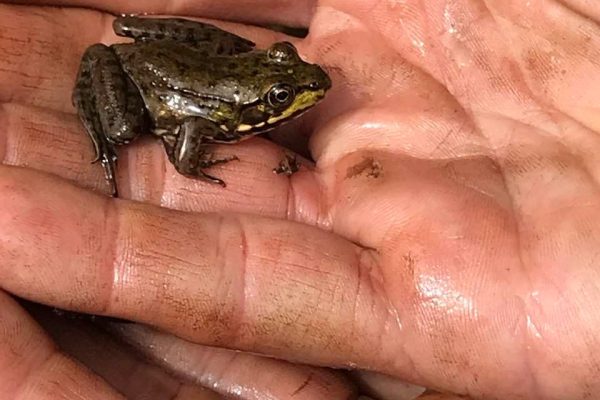Download a PDF of the original ritual below, first printed in 1983. Read about the background to this ritual here. Read the companion piece, “Makom: Making Space for the Orange on the Seder Plate.”
The Feminister Rebba would gather all her Chassidot together for the Passover Seder. She would tell the story again and again of how they came to eat a crust of bread at the Seder table.
Once, in the city of New York, in the borough of Brooklyn, in the district of Williamsburg, my mother, my sisters, women friends, and I were preparing for the Seder. Every year after, we would gather and make the Seder together, for it is written—for the sake of the righteousness of the women did our ancestors leave Egypt.
We were busying ourselves with the baking of the Matzot, the mixing of wine with apples, nuts and raisins for the Charoset, the chopping of the horseradish for maror, while I shook my tambourine.
For it is written: And Miriam the prophet took a tambourine in her hand. And all the women went out after her with tambourines and with danee. And Miriam answered them, “Sing unto God, for God has triumphed gloriously.”
I still remember the dry, hot smell of freshly baked Matzo, can still taste the tangy, sweet Charoset that I licked from my fingers. We talked of Matzo and bitter herb while we worked, of the affliction of our ancestors, and of the many plagues God brought down on the Egyptians.
“Now you all must know why we eat Matzo. The Egyptians pressed upon our ancestors to leave and their bread did not have time to rise. We eat Matzo to remember how once we were slaves, and how God, by the hand of Moses, Aaron and Miriam, brought our people forth from slavery to freedom.”
My mother reminded us that each generation, eaeh woman, is required to see herself as if she left Egypt, for were it not for our deliverance, we and our children, and our children’s children, would still be slaves. And the Rabbis say, in eaeh generation pharoahs rise up to afflict us. Therefore we are conmanded to eat Matzo and to rid our homes of any leavened bread, chometz.
Such thoughts occupied our minds when my sister, Puah, walked in with the bad news.
Only a few days before, Puah had gone to speak to the most prominent Rabbi in New York, the Fabrente Rebbe.
“Rabbi, I have a question of great importance to ask you.” Puah wasonly a girl of about sixteen at the time, but she had the determined spirit that many twice or even three times her age don’t reach.
“Ask, my daughter, ask,” said the Rabbi.
“This is a difficult and unusual question.”
“No question is too difficult or unusual for our Torah.” Now, this Rabbi loved talking dearly, but he preferred to discuss questions like, what should one do if the tiniest piece of chometz falls ino the stew, or how it was derived that we must eat a matzo the size of an olive, or what if one cannot eat the required amount of horseradish without becoming ill. He did not enjoy discussing difficult philosophical or moral questions. He blew up when asked, and earned this title of the Febrente Rebbe—the fiery Rabbi.
“Rabbi, tell me what is the place of a lesbian in Judaism.”
Naturally our good Rabbi did not expect such a question. He jumped from his seat and grabbed my sister’s shoulders, which is forbidden to an orthodox man, but so excited was he, he failed to even notice.
“There is as much place for a lesbian in Judaism as there is for chometz at the Seder table.”
And so angry was the Rabbi that he called the New York Post to tell them.
“There is as much place for lesbians in Judaism as for chometz, leavened bread, at the Seder table. Thats what I, the great Fabrente Rabbi, say.”
We all stopped working. The sound of the tambourine, accompanying the chopping of the maror, the mixing of the charoset, the baking of the matzo stopped. We sat on the floor keening and weeping as our ancestors did, feeling like strangers in a strange land. We sat like that for many hours crying until my mother said, “Come, it is late. We must begin the Seder.”
None of us wanted to rise.
This would be a Passover of mourning and not rejoicing, of slavery, not freedom. For as we would eat the Matzo, each of us would be thinking that our lesbian sister, Puah, had no place in Judaism, as chometz had no place at this Seder table.
We brought wine and Matzo to the table, and the Seder plate of bitter herb, Charoset. My sister Puah was about to begin to ask the four questions. She seemed to brighten. She stood and lifted up her voice, and I thought I could hear Miriam calling the women to dance.
“Why is this night different from all other nights, and this Passover from all other Passovers? For until this Passover there was no place for a chometz on the Seder table, but this night, this Passover, there will be room for chomatz, for a crust of bread. This Passover, there will be a place for lesbians in Judaism – for it is said: There are pharaohs in every generation and in every generation, a woman must leave her own Miztrayim.”
And with that, she placed a crust of bread on the Seder plate.










